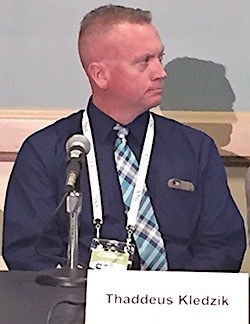LONG BEACH, Calif. – Attendees at the Advanced Clean Transportation EXPO heard a case study on propane school bus adoption by Pasco County Schools north of Tampa Bay, Florida.
Thaddeus Kledzik, Pasco County’s transportation operations supervisor, detailed the district’s experience during the Wednesday breakout session “Transcending Traditional Trends in Transit,” which also included speakers from King County Metro in Seattle (battery electric buses), Stanford University (the nation’s largest battery electric shuttle fleet) and Stark Area Regional Transit Authority in Ohio (hydrogen fuel cell buses).
 Kledzik said Pasco County is paying $0.21 cents less for the district’s 45 propane school buses versus nearly 400 other diesel buses when calculating a the per gallon equivalent. Additionally, an alternative fuel excise tax and a $0.50 cents per gallon rebate have returned nearly $140,400 to the district over the past two years.
Kledzik said Pasco County is paying $0.21 cents less for the district’s 45 propane school buses versus nearly 400 other diesel buses when calculating a the per gallon equivalent. Additionally, an alternative fuel excise tax and a $0.50 cents per gallon rebate have returned nearly $140,400 to the district over the past two years.
“That’s the cost of at least one new additional school bus, or in educational terms hiring three to four teachers,” he added.
Additionally, rebates cover 50 percent of the incremental cost of purchasing new propane school buses, and the alternative fuel infrastructure tax credit provides $30,000 for each of the district’s two propane fueling sites. Three other bus compounds operate diesel school buses, but Kledzik shared that ground is being broken this month on the state’s first fast-fill CNG fueling station on the southwest side of the county for this summer’s initial order of 30 buses. The CNG compound will run at a capacity of 90 buses by the end of next school year, he told STN.
Propane remains the fuel of choice on the east side, Kledzik added, where CNG pipelines are not permitted due to land usage restrictions.
According to district data, propane usage has resulted in up to 20 percent less emissions of nitrogen oxides compared to diesel buses, and 60 percent less carbon monoxide and 24 percent fewer greenhouse gas emissions. Compared to the current clean diesel buses, the district said its propane buses produce 13 percent less greenhouse gas, 95 percent less nitrogen oxide, and 80 percent less hydrocarbons.
In terms of safety, Kledzik said several propane school buses have been involved in crashes, one depicted on video he showed attendees of a big rig turning left into a school bus traveling in the opposite direction. He added that no students or driver were hurt in that incident or others, proving that propane school buses are not the “bomb” that some alternative-fuel detractors claim them to be.
Kledzik told the attendees that the school board originally chose propane five years ago because the OEMs had yet to release a CNG option in a Type-C configuration, and a Type D transit-style bus didn’t fit the district’s operational needs.
Since, of course, both Blue Bird and Thomas Built Buses offer a CNG-powered Type C in addition to Type D CNG options. Kledzik added that electric has never been an option due to a per-bus cost of roughly $250,000 each, a dollar amount that could fund the purchase at least two new school buses.
Editor’s note: School Transportation News is an official media sponsor of the ACT EXPO.
















